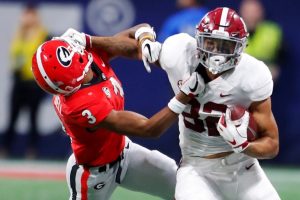How Long Is Too Long?

Diego Pavia has just been granted an injunction that will allow him to play a sixth season of college football. The Pavia case seems narrow but the indication is that, since Division 1 college football is now a “commercial” activity, limiting a student to play only four years is going to go by the boards in many if not all cases.
Pavia initially played two years of Junior College ball which counted against his total four-year eligibility limit (he actually was allowed five years of eligibility instead of the usual four because the NCAA gave an extra year to any player who was in school during COVID). He then played two years at New Mexico State before transferring to Vanderbilt for his fifth and final year of eligibility.
Importantly, Pavia did not argue against the four-year eligibility limit itself. However, he did argue he should be allowed to play four years of Division 1 football because he can get paid.
This is another unintended consequence of the NIL adventure……the NCAA has had a lot of those lately……and provides yet another reason to clean up the mess they (Notre Dame and conference heads included) have made of college football and fix the overall structure including how and how much players get paid.
But back to the Pavia case.
Pavia’s winning argument was that the NCAA is restricting the free marketplace for Pavia by counting his JUCO playing time against total eligibility which bars him from playing for pay at the college level next year. The NCAA had no counter for that because there is no counter to that. Restricting eligibility does mean that an athlete (in this case, Pavia) has to stop playing at the college level at some point.
The narrowest interpretation of this ruling is that JUCO playing time does not count against the four year eligibility limit of any player who played JUCO before 2021. Why 2021? Because NIL payments were allowed by the NCAA beginning in 2021 at every level of college athletics. NIL money is being earned by players in D2 and D3 and even JUCO now.
The judge’s decision to grant the injunction seemed to turn on the player’s ability to make money in the marketplace. Did the 2021 NCAA decision even matter in this discussion? The judge seemed only focused on the two years of JUCO play versus the four years of total eligibility.
So, a broader interpretation might be that the different divisions are different marketplaces, all with different financial benefits, and athletes should be free to access each marketplace to the full extent allowed.
NIL money is sure to flow at a different level at Ohio State than at Youngstown State.
Is it fair to bar a player from accessing the lucrative NIL marketplace of Division 1 after playing 1,2,3 or even 4 years of lower division college football?
The day after the Pavia ruling, Rashul Faison, who already completed his fifth year at Utah State, entered the transfer portal. One of his years was at JUCO. Over twenty players on the USU roster last year had played JUCO and several of them are out of eligibility. Or so they thought.
“I totally disagree with the NCAA’s determination on this,” Steve Sarkisian told reporters when asked about Pavia’s ruling. “We chose to go to junior college football, and that’s where we wanted to start and play our career. I don’t understand it at all. We’ll have guys 28- and 29-years-old playing college football. What’s the point, man? I don’t get it, I don’t understand it, I totally disagree with it.”
What is the one thing that is not being talked about? This decision limits access to play football.
For every sixth-year……what do we call them? Senior +1? For every sixth-year Senior +1 that is playing, there is an athlete that wanted to play that cannot get a spot. If there are a hundred of them, there are a hundred denied access to play and denied access to the marketplace.
It’s got to be fixed and the guys running the show now have shown no capability to do that.
“I think the biggest thing, just in college football in general, is there were so many changes so fast, unregulated, that kind of created a big mess,” Tanner Jacobson, Head Coach Tyler Junior College said.
Is Elon available? I’m sure he’s got some eligibility left.
December 20, 2024


